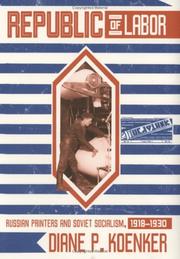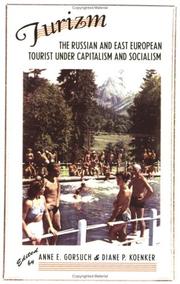| Listing 1 - 10 of 14 | << page >> |
Sort by
|
Book
ISBN: 0691053235 1306990890 1400855691 0691610797 0691101884 0691638861 Year: 2014 Publisher: Princeton, NJ : Princeton University Press,
Abstract | Keywords | Export | Availability | Bookmark
 Loading...
Loading...Choose an application
- Reference Manager
- EndNote
- RefWorks (Direct export to RefWorks)
Whereas most Soviet and American scholars of the Russian Revolution have emphasized the great leaders and the great events of 1917, Diane Koenker reverses this trend in a study of the Russian working class.Originally published in 1981.The Princeton Legacy Library uses the latest print-on-demand technology to again make available previously out-of-print books from the distinguished backlist of Princeton University Press. These editions preserve the original texts of these important books while presenting them in durable paperback and hardcover editions. The goal of the Princeton Legacy Library is to vastly increase access to the rich scholarly heritage found in the thousands of books published by Princeton University Press since its founding in 1905.
Moscow (Russia) --- Working class --- Commons (Social order) --- Labor and laboring classes --- Laboring class --- Labouring class --- Working classes --- Social classes --- Labor --- Political activity&delete& --- History --- Employment --- Soviet Union --- Russia --- Moskva (Russia) --- Moscou (Russia) --- Moskau (Russia) --- Moscú (Russia) --- Moskova (Russia) --- Moscha (Russia) --- Moszkva (Russia) --- Moskav (Russia) --- Moskwa (Russia) --- Moscow (R.S.F.S.R.) --- Mo-ssu-kʻo (Russia) --- Pravitelʹstvo Moskvy --- Maskva (Russia) --- Mosḳṿe (Russia) --- Mosca (Russia) --- Moscova (Russia) --- Māsko (Russia) --- Moscow --- Москвa (Russia) --- Масква (Russia) --- Μόσχα (Russia) --- Moscfa (Russia) --- Social conditions. --- Mosike (Russia) --- 莫斯科 (Russia) --- Pravitelʹstvo Moskvy (Russia) --- Правительство Москвы (Russia) --- Mūskū (Russia) --- موسکو (Russia) --- Travailleurs --- Activite politique --- Histoire. --- Political activity --- History. --- Moscou (R.S.F.S.R.) --- U.R.S.S. --- Conditions sociales. --- Histoire --- Советский Союз --- Ber. ha-M. --- Związek Socjalistycznych Republik Radzieckich --- ZSRR --- Związek Socjalistycznych Republik Sowieckich --- ZSRS --- Szovjetunió --- TSRS --- Tarybų Socialistinių Respublikų Sąjunga --- SRSR --- Soi︠u︡z Radi︠a︡nsʹkykh Sot︠s︡ialistychnykh Respublik --- SSSR --- Soi︠u︡z Sovetskikh Sot︠s︡ialisticheskikh Respublik --- UdSSR --- Shūravī --- Ittiḥād-i Jamāhīr-i Ishtirākīyah-i Shūrāʼīyah --- Russia (1923- U.S.S.R.) --- Sovetskiy Soyuz --- Soyuz SSR --- Sovetskiĭ Soi︠u︡z --- Soi︠u︡z SSR --- Uni Sovjet --- Union of Soviet Socialist Republics --- USSR --- SSṚM --- Sovetakan Sotsʻialistakan Ṛespublikaneri Miutʻyun --- SSHM --- Sovetakan Sotsʻialistakan Hanrapetutʻyunneri Miutʻyun --- URSS --- Unión de Repúblicas Socialistas Soviéticas --- Berit ha-Moʻatsot --- Rusyah --- Ittiḥād al-Sūfiyītī --- Rusiyah --- Rusland --- Soṿet-Rusland --- Uni Soviet --- Union soviétique --- Zȯvlȯlt Kholboot Uls --- Związek Radziecki --- ESSD --- Sahaphāp Sōwīat --- KhSHM --- SSR Kavširi --- Russland --- SNTL --- PSRS --- Su-lien --- Sobhieṭ Ẏuniẏana --- FSSR --- Unione Sovietica --- Ittiḥād-i Shūravī --- Soviyat Yūniyan --- Russian S.F.S.R.
Book
ISBN: 080146773X 9780801467738 9780801451539 0801451531 Year: 2013 Publisher: Ithaca, NY
Abstract | Keywords | Export | Availability | Bookmark
 Loading...
Loading...Choose an application
- Reference Manager
- EndNote
- RefWorks (Direct export to RefWorks)
The Bolsheviks took power in Russia 1917 armed with an ideology centered on the power of the worker. From the beginning, however, Soviet leaders also realized the need for rest and leisure within the new proletarian society and over subsequent decades struggled to reconcile the concept of leisure with the doctrine of communism, addressing such fundamental concerns as what the purpose of leisure should be in a workers' state and how socialist vacations should differ from those enjoyed by the capitalist bourgeoisie. In Club Red, Diane P. Koenker offers a sweeping and insightful history of Soviet vacationing and tourism from the Revolution through perestroika. She shows that from the outset, the regime insisted that the value of tourism and vacation time was strictly utilitarian. Throughout the 1920's and '30's, the emphasis was on providing the workers access to the "repair shops" of the nation's sanatoria or to the invigorating journeys by foot, bicycle, skis, or horseback that were the stuff of "proletarian tourism." Both the sedentary vacation and tourism were part of the regime's effort to transform the poor and often illiterate citizenry into new Soviet men and women. Koenker emphasizes a distinctive blend of purpose and pleasure in Soviet vacation policy and practice and explores a fundamental paradox: a state committed to the idea of the collective found itself promoting a vacation policy that increasingly encouraged and then had to respond to individual autonomy and selfhood. The history of Soviet tourism and vacations tells a story of freely chosen mobility that was enabled and subsidized by the state. While Koenker focuses primarily on Soviet domestic vacation travel, she also notes the decisive impact of travel abroad (mostly to other socialist countries), which shaped new worldviews, created new consumer desires, and transformed Soviet vacation practices.
Culture and tourism --- Socialism and culture --- Vacations --- Tourism --- Ethnotourism --- Tourism and culture --- Culture and socialism --- Culture --- Holidays (Vacations) --- Holidays --- Recreation --- School attendance --- Holiday industry --- Operators, Tour (Industry) --- Tour operators (Industry) --- Tourism industry --- Tourism operators (Industry) --- Tourist industry --- Tourist trade --- Tourist traffic --- Travel industry --- Visitor industry --- Service industries --- National tourism organizations --- Travel --- History. --- Social aspects --- Economic aspects --- Soviet Union --- Social life and customs.

ISBN: 1501731718 9781501731716 0801443083 9780801443084 Year: 2018 Publisher: Ithaca, NY
Abstract | Keywords | Export | Availability | Bookmark
 Loading...
Loading...Choose an application
- Reference Manager
- EndNote
- RefWorks (Direct export to RefWorks)
The long decade from the October Revolution to 1930 was the beginning of a great experiment to create a socialist society. Throughout these years, socialist trade unions attempted to transform the Russian worker into a productive and enthusiastic participant in this new order. How did the workers themselves react to these efforts? To what extent were they and their culture transformed into the ideal forms proclaimed in the official ideology? In Republic of Labor, Diane P. Koenker illuminates the lived experience of Russia's printers, workers who differed from their comrades because of their skill and higher wages, but who shared the same challenges of economic hardship and dangerous conditions. Paying close attention to the links between work, politics, and the everyday, the author focuses on workers' efforts to define their place in socialist society. Gender issues are also emphasized, and here we see the persistence of a masculinist working-class culture counterposed to an official culture promoting gender equality. Through this engaging narrative, Koenker develops a highly original discourse about class in Soviet society that will interest all students of Russian history as well as those readers who wish to reinvigorate class as a historical and sociological tool of analysis.
Industrial relations --- Printers --- Printing industry --- Labor --- Working class --- Capital and labor --- Employee-employer relations --- Employer-employee relations --- Labor and capital --- Labor-management relations --- Labor relations --- Employees --- Management --- Manufacturing industries --- Labor and laboring classes --- Manpower --- Work --- History. --- Labor unions
Book
ISBN: 9781400855698 Year: 2014 Publisher: Princeton, NJ
Abstract | Keywords | Export | Availability | Bookmark
 Loading...
Loading...Choose an application
- Reference Manager
- EndNote
- RefWorks (Direct export to RefWorks)
Book
Year: 2000 Publisher: Washington: U.S. G.P.O.,
Abstract | Keywords | Export | Availability | Bookmark
 Loading...
Loading...Choose an application
- Reference Manager
- EndNote
- RefWorks (Direct export to RefWorks)
Archives --- Language arts & disciplines --- Archives --- Language arts & disciplines

ISBN: 9780801473289 9780801444838 0801473284 0801444837 Year: 2006 Publisher: Ithaca : Cornell University Press,
Abstract | Keywords | Export | Availability | Bookmark
Book
ISBN: 0253009499 9780253009494 1299636373 9781299636378 9780253009296 0253009294 9780253009371 0253009375 Year: 2013 Publisher: Bloomington
Abstract | Keywords | Export | Availability | Bookmark
 Loading...
Loading...Choose an application
- Reference Manager
- EndNote
- RefWorks (Direct export to RefWorks)
The 1960's have reemerged in scholarly and popular culture as a protean moment of cultural revolution and social transformation. In this volume socialist societies in the Second World (the Soviet Union, East European countries, and Cuba) are the springboard for exploring global interconnections and cultural cross-pollination between communist and capitalist countries and within the communist world. Themes explored include flows of people and media; the emergence of a flourishing youth culture; sharing of songs, films, and personal experiences through tourism and international festivals; and
Social change --- Popular culture --- Socialism --- Acculturation --- Change, Social --- Cultural change --- Cultural transformation --- Societal change --- Socio-cultural change --- Social history --- Social evolution --- Culture, Popular --- Mass culture --- Pop culture --- Popular arts --- Communication --- Intellectual life --- Mass society --- Recreation --- Culture --- Marxism --- Social democracy --- Socialist movements --- Collectivism --- Anarchism --- Communism --- Critical theory --- Culture contact --- Development education --- Civilization --- Ethnology --- Assimilation (Sociology) --- Cultural fusion --- Social aspects --- History. --- History --- Communist countries --- Western countries --- Soviet Union --- Iron curtain lands --- Russian satellites --- Second world (Communist countries) --- Soviet bloc --- Former communist countries --- Occident --- West (Western countries) --- Western nations --- Western world --- Developed countries --- Советский Союз --- Ber. ha-M. --- Zwia̦zek Socjalistycznych Republik Radzieckich --- Szovjetunió --- TSRS --- Tarybų Socialistinių Respublikų Sąjunga --- SRSR --- Soi︠u︡z Radi︠a︡nsʹkykh Sot︠s︡ialistychnykh Respublik --- SSSR --- Soi︠u︡z Sovetskikh Sot︠s︡ialisticheskikh Respublik --- UdSSR --- Shūravī --- Ittiḥād-i Jamāhīr-i Ishtirākīyah-i Shūrāʼīyah --- Russia (1923- U.S.S.R.) --- Sovetskiy Soyuz --- Soyuz SSR --- Sovetskiĭ Soi︠u︡z --- Soi︠u︡z SSR --- Uni Sovjet --- Union of Soviet Socialist Republics --- USSR --- SSṚM --- Sovetakan Sotsʻialistakan Ṛespublikaneri Miutʻyun --- SSHM --- Sovetakan Sotsʻialistakan Hanrapetutʻyunneri Miutʻyun --- URSS --- Unión de Repúblicas Socialistas Soviéticas --- Berit ha-Moʻatsot --- Rusyah --- Ittiḥād al-Sūfiyītī --- Rusiyah --- Rusland --- Soṿet-Rusland --- Uni Soviet --- Union soviétique --- Zȯvlȯlt Kholboot Uls --- Związek Radziecki --- ESSD --- Sahaphāp Sōwīat --- KhSHM --- SSR Kavširi --- Russland --- SNTL --- PSRS --- Su-lien --- Sobhieṭ Ẏuniẏana --- FSSR --- Unione Sovietica --- Ittiḥād-i Shūravī --- Soviyat Yūniyan --- Russian S.F.S.R. --- Social life and customs. --- Relations --- Social life and customs --- Związek Socjalistycznych Republik Radzieckich --- ZSRR --- Związek Socjalistycznych Republik Sowieckich --- ZSRS --- Culture contact (Acculturation)
Book
ISBN: 0691008140 Year: 1987 Publisher: Princeton (N.J.): Princeton university press
Abstract | Keywords | Export | Availability | Bookmark
 Loading...
Loading...Choose an application
- Reference Manager
- EndNote
- RefWorks (Direct export to RefWorks)
Bibliotheek François Vercammen
Book
ISBN: 0691008159 Year: 1987 Publisher: Princeton (N.J.): Princeton university press
Abstract | Keywords | Export | Availability | Bookmark
 Loading...
Loading...Choose an application
- Reference Manager
- EndNote
- RefWorks (Direct export to RefWorks)

Abstract | Keywords | Export | Availability | Bookmark
 Loading...
Loading...Choose an application
- Reference Manager
- EndNote
- RefWorks (Direct export to RefWorks)
Industrial relations --- Labor --- Printers --- Printing industry --- Working class --- History. --- Labor unions --- Soviet Union --- History
| Listing 1 - 10 of 14 | << page >> |
Sort by
|

 Search
Search Feedback
Feedback About UniCat
About UniCat  Help
Help News
News